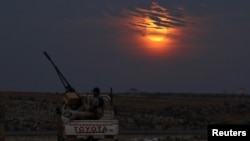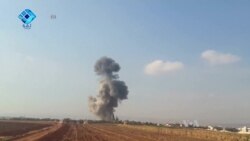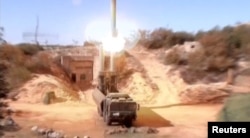As Russian and Syrian government forces resume air attacks on Aleppo, there are growing fears among Syrian rebels they may lose U.S. support once President-elect Donald Trump takes office. Across the Middle East, rival powers are trying to digest the implications of Trump’s election victory.
Russian jets take off from the aircraft carrier Admiral Kuznetsov to launch airstrikes on rebel-held Aleppo, Syria. Moscow said it was the first time in Russian naval history that its single aircraft carrier has been involved in combat actions.
The United States accuses Russia and its Syrian government allies of causing mass civilian deaths; but, President-elect Donald Trump signaled a softened tone during his election campaign, and that could herald a change of policy, says Jane Kinninmont of London policy institute Chatham House.
“Trump has been relatively positive about Russia under Vladimir Putin, and Russia’s role in Syria as a supposed force against ISIS,” said Kinninmont.
That has raised fears the Trump administration may withdraw support for Sunni rebel fighters, handing a big advantage to the Syrian government and its Shi’ite backers in Iran.
Conversely, Trump’s pledge to tear up the nuclear deal struck between Iran and the West, which saw sanctions dropped in return for limits on nuclear activity, has gained him some support among Sunni regional powers. Trump has described the agreement as "disastrous" and the "worst deal ever negotiated."
“[U.S. President Barack] Obama has been really disliked by Gulf elites most of all because of the deal with Iran. They regard him as having been soft and naive on Iran. And the more hawkish language that Donald Trump has used has gone down well; but, there is complete uncertainty about what it means in practice,” said Kinninmont.
Wednesday, French President Francois Hollande warned Trump against reneging on the nuclear deal with Iran.
He said the deal gives guarantees, and that the absence of an agreement would be very serious.
There are as yet few guarantees over the direction of Trump’s future foreign policy. Researcher Jane Kinninmont of Chatham House predicts his approach will mark a sharp contrast to that of Barack Obama.
“Trump has for years given the impression that he respects the strongman model of government, whether that is in China or in Russia, and that he has seen dictators in the Middle East as at least a force against terrorism,” said Kinninmont.
With conflicts raging from Yemen to Libya, analysts say the Middle East will likely provide the first test for Trump’s promised strategic reset of U.S. foreign policy.















